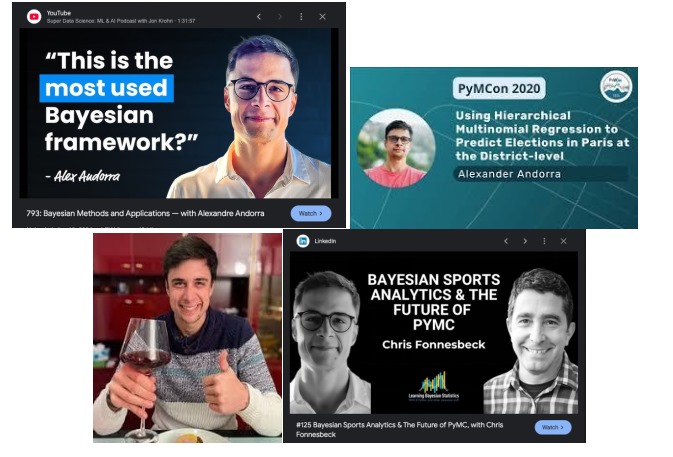Bayesian statistics in contemporary data science signify a paradigm revolution in probabilistic argumentation that provides solid infrastructures for uncertain decision-making. Alexandre Andorra stands out in this field with his contributions, notably in sport analytics and open-source software implementation. Bayesian inference, which blends knowledge before an experience with experiential information to revise probabilistic conclusions, requires top-tier expertise in math, coding, and domain-optimized problem-solving—a combination that Andorra honed over a span of decades across multiple fields.
Advancements in Bayesian Statistics
Progress in Bayesian statistics in recent times has been driven by advances in computational methods and algorithms’ efficiency. Hierarchical modeling, Gaussian processes, and causal inference methods now allow analysts to tackle issues from high-dimensional data to predictions in dynamic systems. These methods are progressively essential in sectors such as healthcare, agriculture, and sports, where uncertainty quantification and adaptive modeling inform strategic choices. Andorra’s achievements in these fields underscore the increasing need for individuals who are capable of marrying technical expertise with practical application—a difficult combination that separates superior practitioners.
Andorra’s Transformative Projects
Andorra’s career is characterized by transformative projects that demonstrate the versatility of Bayesian methods. As a Senior Applied Scientist with the Miami Marlins, he developed predictive models that refine player performance analytics, directly influencing roster strategies and development programs. Beyond sports, his work in electoral forecasting through Multilevel Regression and Poststratification (MRP) models has provided transparent, reproducible frameworks for political analysis.
Applying Bayesian Methods to Agriculture and Healthcare
His use of Gaussian processes in agricultural optimization and cancer research—e.g., enhancing crop robustness and aiding RNA vaccine design—demonstrates his skill in applying Bayesian methods to various challenges. His most recent and important work is his soccer-factor model, which presents a thorough and evidence-based method for assessing and understanding soccer performance. The accompanying dashboard is refreshed every week, adding the newest statistics from games that have been contested globally. The model is ensured to stay current and mirror accurately the constantly fluctuating dynamics of the sport as a result of this.
Role in PyMC Development
A cornerstone of Andorra’s influence is his role as a core developer of PyMC, the leading Python library for Bayesian statistics. His implementation of the ZeroSumNormal distribution addressed over-parameterization in hierarchical models, a technical advancement exclusive to PyMC that has been widely adopted in academic and industrial research. This contribution, alongside his leadership in open-source communities, underscores his commitment to democratizing access to advanced statistical tools.
Educating the Next Generation of Data Scientists
Apart from his technical work, Andorra has contributed immensely through his podcast, Learning Bayesian Statistics, which has attracted a worldwide audience of more than 12,000 monthly listeners and created a community of engaged learners interested in Bayesian approaches. The popularity of the podcast is attested to by its standing in the top 1.5% of podcasts worldwide and its ranking as one of the 15 Best Statistics Podcasts in the world in 2024
The Intuitive Bayes Platform
His web-based platform, Intuitive Bayes, also narrows the gap between theory and application, teaching probabilistic programming and model diagnostics to hundreds of students. Such activities fill significant holes in STEM education, providing future data scientists with skills critical for technological competitiveness.
Contributions to the Data Science Community
He has also made appearances on the Super Data Science and Stats+Stories podcasts and presented at international statistics conferences such as PyData NYC and StanCon Oxford. These appearances and presentations have further strengthened his reputation as an innovator in this fast-growing field.
Broader Impact of Andorra’s Work
The larger significance of Andorra’s research supports U.S. interests in innovation and economic development. Through his advancements in predictive analytics for sports, he helps a multibillion-dollar sector that is core to cultural and economic participation. His methodological advances in healthcare analytics, like the optimization of cancer treatment plans, support national initiatives for enhancing public health outcomes. His educational platforms also enhance the nation’s domestic STEM workforce, keeping the U.S. at the vanguard of data science innovation.
Recognition by Colleagues and Collaborators
Colleagues and collaborators consistently recognize Andorra’s expertise. Chris Fonnesbeck, former Principal Quantitative Analyst at the Philadelphia Phillies and creator of the PyMC software, notes his “redefinition of player performance metrics,” while Ravin Kumar, Research Data Scientist at Google, credits Andorra’s vision for PyMC’s evolution into a leading Bayesian tool. These endorsements, documented in his professional references, validate his standing as a trusted authority in the field.
Conclusion:
In blending technical sophistication with community-based learning, Alexandre Andorra embodies the interdisciplinary knowledge necessary to propel Bayesian statistics. Not only does his work extend the frontiers of probabilistic modeling, but it also illustrates its revolutionary potential across industries vital to societal advancement. As more industries turn to data-driven decision-making, Andorra’s work guarantees Bayesian approaches remain actionable, accessible, and aligned with international innovation currents.





























